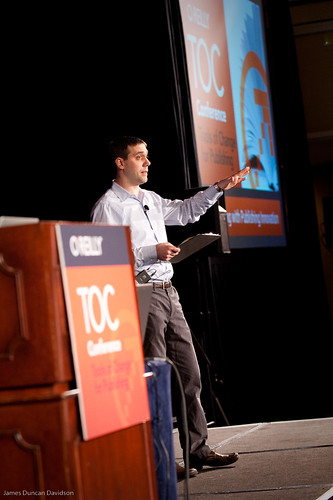 Perhaps Paul should be the one covering this, since he’s the one who’s actually gone to e-book conferences over the last couple of years—but since I’m the one who’s awake right now, I’m calling dibs.
Perhaps Paul should be the one covering this, since he’s the one who’s actually gone to e-book conferences over the last couple of years—but since I’m the one who’s awake right now, I’m calling dibs.
Edward Nawotka has a pair of posts on Publishing Perspectives—a feature and a short editorial—relating to the subjects of e-book conferences. While Tools of Change was going on, Nawotka was serving jury duty. This gives him an opening to find some amusing similarities between the two events: they both involve taking time off from work and travelling to strange environs, listening to “experts”, and standing in judgment.
Then he gets to the point:
Now, I want you to consider what it would be like if you were required to serve jury duty every week for the next several months.That’s what it currently feels like in the book business right now.
Since December, Nawotka notes, there have been three e-book conferences, and over the next few months there are going to be half a dozen more. These conferences eat up a lot of time, but “provide the raw material for inspiration” for moving forward in the industry.
In the editorial, Nawotka takes note of the time and money required to attend all these conferences (or for that matter, even one conference) and wonders whether it amounts to “a pay-wall around best-practices” that could create an “e-book elite” in the persons of those who can afford to attend.
It’s a good question. Perhaps someday, if I can attend such an event, I will be able to see what it is like to be part of the answer. I must admit to feeling a bit of envy for the people who are able to attend these events—though I suspect I would feel rather less envy if I actually did manage to attend one.

































Okay: First of all, I don’t see much of a similarity between going to a conference, where (supposedly) you will gain personal and professional insight to use to advance your profession… and a civic duty requiring you to sit in judgment of your peers.
Secondly, it is sites like this one (and people like Paul Biba) that remove the “pay-wall” to conferences and their information downloads, and allow anyone, anywhere in the world, access to that same information.
Of course, if the only reason you go to a conference is at the behest of a clueless boss, you expect to learn nothing, and use it as an excuse to pad your expense account and goof off… well, maybe people like that are the reason the publishing industry finds itself in need of holding so many conferences…
Not being in the publishing industry (just a loud mouthed outsider) my concern is that if all these conferences feature the same people talking to themselves, might it not lead to groupthink and a disconnect, much as the various internet special-interest communities foster?
Not having attended any of these conferences, I have to wonder if any heretics attend and if they did, how would they be received? Would anybody pay attention if somebody pointed out the emperor is buck nekkid?
Too many communities spend all their time “communicating” but the only messages being communicated are those that reinforce/validate their existing values/outlooks.
Me, before I worried about casting myself as some kind of insider “elite”, I’d worry about closing myself off from the greater world outside.
But that’s just me, of course. 😉
As someone who has watched the publishing industry for many years, I’d say that these conferences change nothing about insider/outsider.
Since the days when publishers were owned by old-money Ivy Leaguers, big publishing has always been an incestuous little community, and ebooks haven’t changed that.
All these conferences certainly show publishing’s uncertainty about ebooks and the changes in publishing. They remind me of that old SATURDAY NIGHT LIVE sketch with Steve Martin staring stupidly into the camera and repeating, “What the Hell is that thing?”
The conferences also allow the techies to exchange info., and the players on the technology and software side to ply their wares to all the interested parties.
I doubt the conferences have changed the hearts and minds of those handling ebook policy within the big publishers because, as is obvious from all the CEO speak we’ve heard, most of them still haven’t got it, whatever “it” is.
Isn’t every profession like that though? For example, you can’t be a teacher here without a license and you have to complete an authorized degree program in order to get the license. So if you really want to be a teacher but can’t afford to go to school full-time for a year, tough luck. You also can’t practice law without a law degree, or practice medicine without a medical degree…